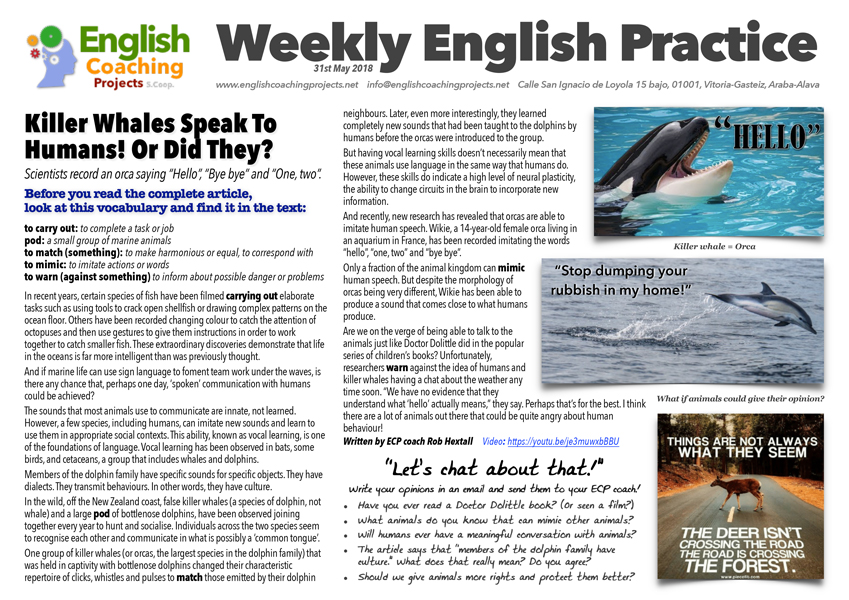Click on the image to download the pdf
Scientists record an orca saying “Hello”, “Bye bye” and “One, two”.
Before you read the complete article, look at this vocabulary and find it in the text:
to carry out: to complete a task or job
pod: a small group of marine animals
to match (something): to make harmonious or equal, to correspond with
to mimic: to imitate actions or words
to warn (against something) to inform about possible danger or problems
Listen to the audio
In recent years, certain species of fish have been filmed carrying out elaborate tasks such as using tools to crack open shellfish or drawing complex patterns on the ocean floor. Others have been recorded changing colour to catch the attention of octopuses and then use gestures to give them instructions in order to work together to catch smaller fish. These extraordinary discoveries demonstrate that life in the oceans is far more intelligent than was previously thought.
And if marine life can use sign language to foment teamwork under the waves, is there any chance that, perhaps one day, ‘spoken’ communication with humans could be achieved?
The sounds that most animals use to communicate are innate, not learned. However, a few species, including humans, can imitate new sounds and learn to use them in appropriate social contexts. This ability, known as vocal learning, is one of the foundations of language. Vocal learning has been observed in bats, some birds, and cetaceans, a group that includes whales and dolphins.
Members of the dolphin family have specific sounds for specific objects. They have dialects. They transmit behaviours. In other words, they have culture.
In the wild, off the New Zealand coast, false killer whales (a species of dolphin, not whale) and a large pod of bottlenose dolphins, have been observed joining together every year to hunt and socialise. Individuals across the two species seem to recognise each other and communicate in what is possibly a ‘common tongue’.
One group of killer whales (or orcas, the largest species in the dolphin family) that was held in captivity with bottlenose dolphins changed their characteristic repertoire of clicks, whistles and pulses to match those emitted by their dolphin neighbours. Later, even more interestingly, they learned completely new sounds that had been taught to the dolphins by humans before the orcas were introduced to the group.
But having vocal learning skills doesn’t necessarily mean that these animals use language in the same way that humans do. However, these skills do indicate a high level of neural plasticity, the ability to change circuits in the brain to incorporate new information.
And recently, new research has revealed that orcas are able to imitate human speech. Wikie, a 14-year-old female orca living in an aquarium in France, has been recorded imitating the words “hello”, “one, two” and “bye bye”.
Only a fraction of the animal kingdom can mimic human speech. But despite the morphology of orcas being very different, Wikie has been able to produce a sound that comes close to what humans produce.
Are we on the verge of being able to talk to the animals just like Doctor Dolittle did in the popular series of children’s books? Unfortunately, researchers warn against the idea of humans and killer whales having a chat about the weather any time soon. “We have no evidence that they understand what ‘hello’ actually means,” they say. Perhaps that’s for the best. I think there are a lot of animals out there that could be quite angry about human behaviour!
“Let’s chat about that!”
Write your opinions in an email and send them to your ECP coach!
- Have you ever read a Doctor Dolittle book? (Or seen a film?)
- What animals do you know that can mimic other animals?
- Will humans ever have a meaningful conversation with animals?
- The article says that “members of the dolphin family have culture.” What does that really mean? Do you agree?
- Should we give animals more rights and protect them better?
Written by ECP coach Rob Hextall Video: https://youtu.be/je3muwxbBBU

